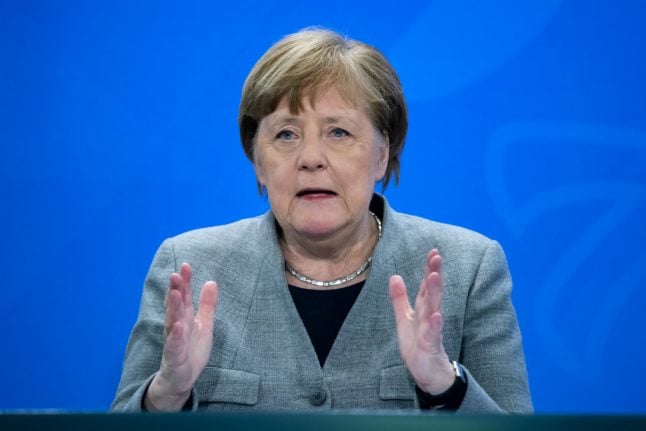Shops up to 800 square metres will be allowed to reopen once they have “plans to maintain hygiene”, Merkel said, while schools will gradually reopen with priority given to pupils about to take exams.
Meanwhile, a ban on large public events will be upheld until August 31st to prevent possible mass transmissions of the virus.
Merkel thanked residents in Germany for complying with social distancing measures in place to stem the spread of coronavirus – but said they would need to continue.
The government and federal states decided Wednesday to keep measures in place up to and including at least May 3rd.
They include a ban on gatherings of more than two people outside who aren't from the same family or household, as well as a minimum 1.5 metre distance from others in public.
“This will continue to apply, and violations of it will continue to be punished by the authorities,” said Merkel.
The Chancellor said public life could return in Germany “in small steps”.
Here's an overview:
- Shops up to 800 square metres will be allowed to reopen from April 20th with strict measures. Hairdressers could open from May 4th but staff must organise protective measures
- Schools will gradually reopen from May 4th, with primary and secondary school levels returning to class first
- The government is recommending that protective face masks be worn on public transport and in shops – though it is not mandatory
- Major events including football matches are banned until August 31st while religious gatherings will remain banned for now
- Restaurants, bars, cafes and cinemas will have to remain closed
- Border controls in Germany will stay in place for another 20 days
Merkel said the next steps will be discussed by the federal and state governments on April 30th.
Reviews of the looser measures with an eye on infection rates would follow every two or three weeks, said Merkel.
Questioned on the limitations on which shops can open, she said “we have to be careful that we don't completely re-enable public activity in city centres, because then chains of infection will arise”.
“I want to thank citizens who have changed their lives, given up on social contacts, who have limited themselves, very warmly,” she added.
“Not because they wanted to do the government a favour, but because they wanted to help their fellow people. That's something very strong and important our country is experiencing.”
Merkel called again called on citizens to continue to adhere to the restrictions in the fight against the corona pandemic.
Although Germany's health service had not been overburdened, Merkel said it was “a fragile interim success”.
She said everyone would have to live with the virus as long as there were no treatment and no vaccine.
“We have to secure the success we have achieved,” she said.
This is how Angela Merkel explained the effect of a higher #covid19 infection rate on the country's health system.
This part of today's press conf was great, so I just added English subtitels for all non-German speakers. #flattenthecurve pic.twitter.com/VzBLdh16kR
— Benjamin Alvarez (@BenjAlvarez1) April 15, 2020
READ ALSO: What's the latest on coronavirus in Germany and what do I need to know?
Schools to gradually reopen from May 4th
Among the plans, schools are to reopen gradually in Germany from May 4th, starting with older pupils. And some primary school pupils will also be able to return to the classroom.
Merkel said that a “very careful, step-by-step approach” was needed.
The Conference of Education Ministers is to present a concept for further steps on how teaching can be resumed “under special hygiene and protective measures” by April 29th.
They will look at social distancing measures such as reduced class sizes.
In addition to lessons, breaks and school bus services should also be taken into account. “Every school needs a hygiene plan,”.
School authorities are called upon to create and permanently ensure hygienic conditions on site.
Major events ban
Major events are to be banned until August 31st. This ban “effectively contributes to the containment of the coronavirus and at the same time provides urgently needed clarity for organisers, including many clubs,” the government said.
Further rules on this will be decided by the federal states.
States could differ
The timetable of exiting the lockdown could be different in individual states depending on the situation.
Bavarian state premier Markus Söder said businesses would open “a little later” than in other states.
He said he wanted to see protective face masks on public transport as a “requirement” rather than a recommendation.
Bavaria also wants to reopen schools gradually from May 11th.
Lockdown measures introduced in March
Germany's current lockdown measures were announced by Merkel on March 22nd, and were extended until April 19th.
As of Wednesday, April 15th, there were more than 132,000 confirmed coronavirus cases in Germany, according to Johns Hopkins University figures.
Of the total, around 68,800 people have reported themselves to have fully recovered from the virus while more than 3,400 people have died.



 Please whitelist us to continue reading.
Please whitelist us to continue reading.
Member comments